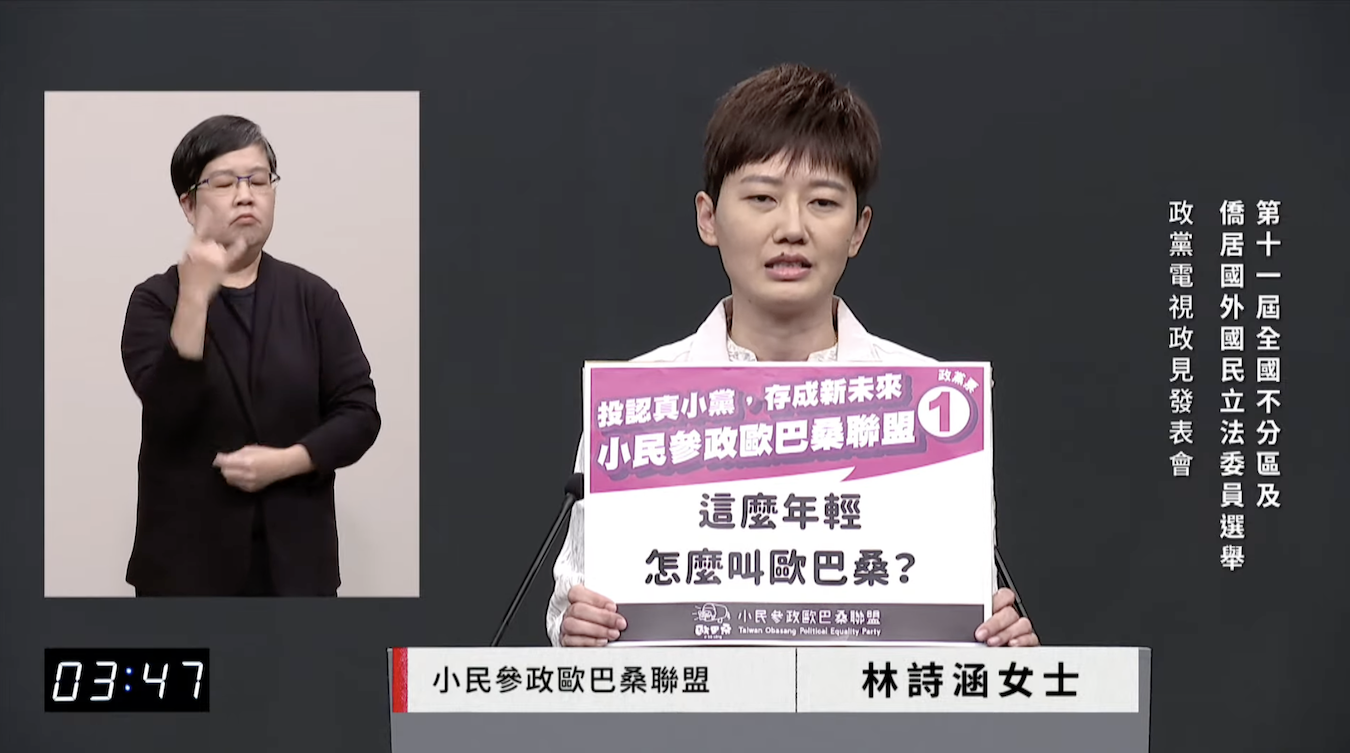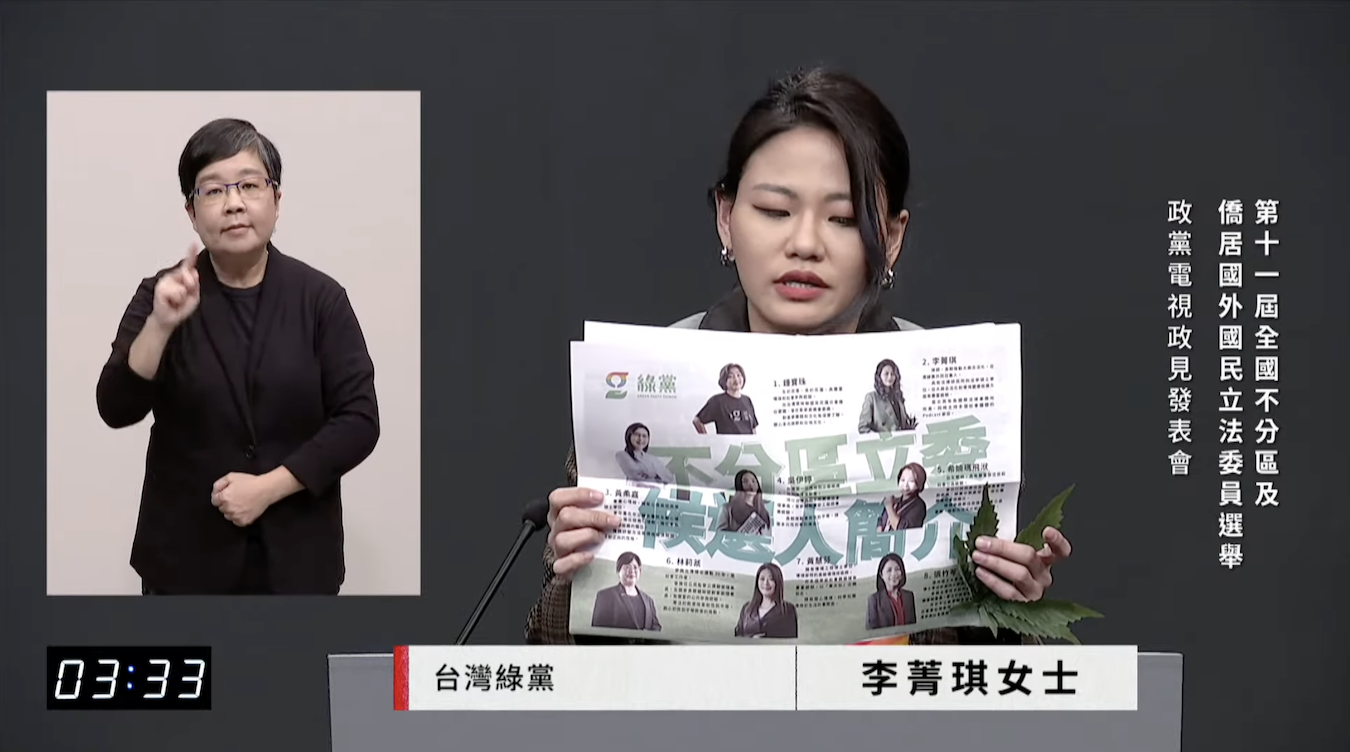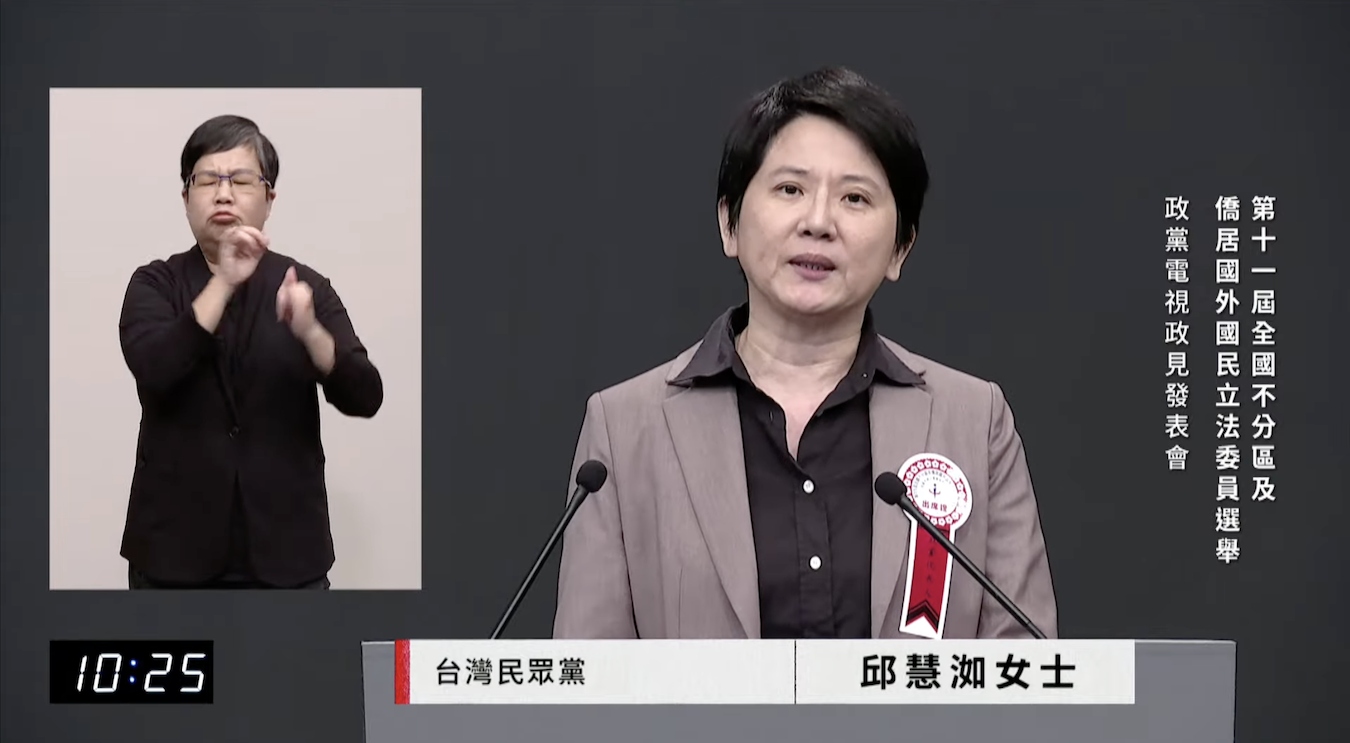by Brian Hioe
語言:
English
Photo Credit: CTV/Screenshot
THE FIRST-EVER POLICY presentation for political parties was held on Wednesday. This saw some controversy, with the Taiwan Statebuilding Party, Taiwan Obasan Political Equality Party, and Green Party Taiwan demonstrating that they were given less time to speak than larger more electorally viable parties such as the DPP, KMT, and TPP. While there were sixteen parties represented, the following article will only focus on some of the parties.
The Taiwan Obasan Political Equality Party was represented by Lin Shih-han. The party stressed how it is a party composed of women who are considered middle-aged mothers, that the party seeks to push for socially progressive policy and a more inclusive society. The party promotes policy that is inclusive of members of the LGBTQ community, as well as better policies for childcare to address issues regarding Taiwan’s declining birthrate. Lin also criticized how the current political system in Taiwan is not favorable for small parties.
 Lin Shih-han of the Taiwan Obasan Political Equality Party. Photo credit: CTV/Screenshot
Lin Shih-han of the Taiwan Obasan Political Equality Party. Photo credit: CTV/Screenshot
The Green Party Taiwan was represented by party chair Zoe Lee, a human rights lawyer best known as a cannabis decriminalization advocate. Lee emphasized that the Green Party is a party that is not only concerned with environmental issues, but has a pro-Taiwan sovereignty stance. To this extent, the Green Party Taiwan calls for more equality for those discriminated against in contemporary society, including members of the LGBTQ community, Indigenous, cannabis users, and others. Lee also stressed the Green Party Taiwan’s environmental policy aims for a more sustainable democracy in Taiwan, as well as improvements in labor conditions in Taiwan.
The Taiwan Statebuilding Party was represented by party chair Shinichi Chen, who spoke almost entirely in Taiwanese Hokkien. Chen spoke about the limitations of Taiwanese democracy at present, in which there are many partisan conflicts, but the continued existence of the KMT proved an obstacle to more stable grounds for democracy. As such, the Taiwan Statebuilding Party called for social renewal in Taiwan and the need for another pro-Taiwan party in Taiwanese politics. Chen also hit back against the TPP and KMT over its prospective alliance as pan-Blue parties, criticizing KMT politicians with links to Taiwan’s authoritarian past such as Chiang Wan-an, and attacking the institutions of the ROC as colonial in nature.
 Zoe Lee of the Green Party Taiwan. Photo credit: CTV/Screenshot
Zoe Lee of the Green Party Taiwan. Photo credit: CTV/Screenshot
Jean Kuo represented the DPP. Kuo brought up the dangers of the KMT taking power if Han Kuo-yu becomes the speaker of the legislature, given how he was recalled by large margins as mayor of Kaohsiung. Kuo touted the economic successes of the Tsai administration and its accomplishments in strengthening the social safety net, while suggesting that if the KMT took power, it would seek to reverse social progress through means including attempting to repeal gay marriage.
As for the NPP, which was represented by legislator Wang Bao-hsuan. Wang defended the record of the NPP, in spite of the public departures of the party in recent years, stating that the party continued to be focused on policy under the leadership of Claire Wang. Wang touted the NPP’s successes in pushing for greater traffic safety in Taiwan, providing for better mental health services in Taiwan, and seeking to provide for a social safety net that can take care of people from birth until death. Wang also criticized the TPP and KMT as corrupt, given the wealthy politicians that were part of both parties, stated that the party would aim to protect whistleblowers, and emphasized that the NPP was a pro-Taiwan party.
The KMT was represented by Ko Chih-en. Ko framed the DPP as dangerously pro-independence, while criticizing pan-Green parties in the policy presentation for fixating on the dangers of Han Kuo-yu becoming speaker of the legislature. Ko attacked the KMT as failure to resolve social inequalities and asserted that claims by the DPP that the KMT would try to reverse social progress through measures such as repealing gay marriage were disinformation.
 Chiu Hui-ju of the TPP. Photo credit: CTV/Screenshot
Chiu Hui-ju of the TPP. Photo credit: CTV/Screenshot
The New Party’s representative Wang Jian-sheng. Wang stressed that was running for legislator despite being 85 and having run in the past because of the dangers currently facing Taiwan. Wang stated that he was running was because there was no party in Taiwanese politics that was advocating unification with China at present and this was why the New Party was important. Wang stressed how China was much larger than Taiwan and Taiwan has no path forward except unification.
Chiu Hui-ju spoke on behalf of the TPP. Chiu stated that the TPP would reform the legislature in order to break through the deadlock of the pan-Blue and pan-Green camp. Otherwise, Chiu emphasized that the TPP would focus on issues such as housing justice and labor issues, and attacked the Tsai administration on failing to implement judicial reform. Chiu alleged that the comparative lack of coverage regarding the TPP was because of the DPP manipulating the media.
One notes that, as with the presidential race as a whole, many of the party representatives agreed on what the social issues facing Taiwan were. Where the candidates and parties differed was with regard to their emphases, political styles, and stances on cross-strait issues. This reflects how long-standing dynamics present in Taiwanese politics persist, then, given the current contention between Taiwanese political parties.

